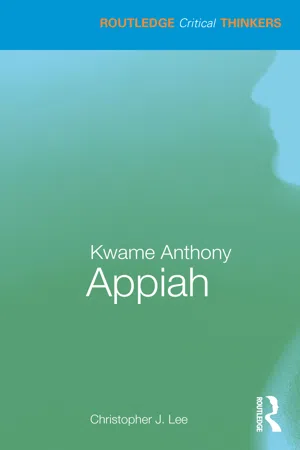
- 206 pages
- English
- ePUB (mobile friendly)
- Available on iOS & Android
Kwame Anthony Appiah
About this book
This clear and engaging introduction is the first book to assess the ideas of Kwame Anthony Appiah, the Ghanaian-British philosopher who is a leading public intellectual today. The book focuses on the theme of 'identity' and is structured around five main topics, corresponding to the subjects of his major works: race, culture, liberalism, cosmopolitanism, and moral revolutions.
This helpful book:
• Teaches students about the sources, opportunities, and dilemmas of personal and social identity—whether on the basis of race, gender, sexuality, or class, among others—in the purview of Appiah.
• Locates Appiah within a broader tradition of intellectual engagement with these issues—involving such thinkers as W. E. B. Du Bois, John Stuart Mill, and Martha Nussbaum—and, thus, how Appiah is both an inheritor and innovator of preceding ideas.
• Seeks to inspire students on how to approach and negotiate identity politics in the present.
This book ultimately imparts a more diverse and wider-reaching geographic sense of philosophy through the lens of Appiah and his intellectual contributions, as well as emphasizing the continuing social relevance of philosophy and critical theory more generally to everyday life today.
Tools to learn more effectively

Saving Books

Keyword Search

Annotating Text

Listen to it instead
Information
Table of contents
- Cover
- Half-Title
- Series
- Title
- Copyright
- Contents
- Series editor’s preface
- Acknowledgments
- Abbreviations
- Why Appiah?
- KEY IDEAS
- After Appiah
- Further reading
- Bibliography
- Index
Frequently asked questions
- Essential is ideal for learners and professionals who enjoy exploring a wide range of subjects. Access the Essential Library with 800,000+ trusted titles and best-sellers across business, personal growth, and the humanities. Includes unlimited reading time and Standard Read Aloud voice.
- Complete: Perfect for advanced learners and researchers needing full, unrestricted access. Unlock 1.4M+ books across hundreds of subjects, including academic and specialized titles. The Complete Plan also includes advanced features like Premium Read Aloud and Research Assistant.
Please note we cannot support devices running on iOS 13 and Android 7 or earlier. Learn more about using the app